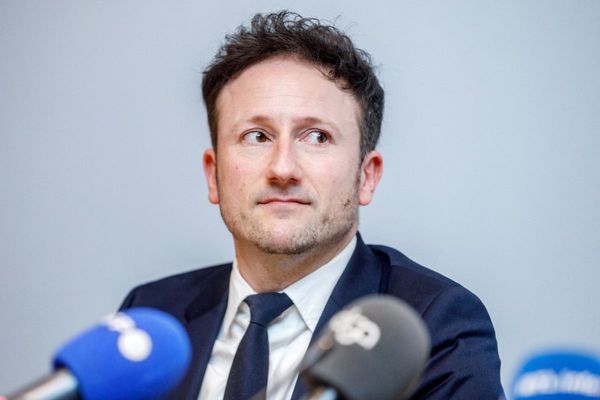
Nineteen forty-five was a pivotal moment in international law, marking the founding of the United Nations and the International Military Tribunal to investigate war crimes committed during the second world war. Eighty years on, it is increasingly being said that we are living through a moment of great change, towards a world that is without such law.
In September, the Financial Times published an editorial headlined “A world without rules”. That view was premised on two incidents: Israel’s launch of a missile strike on a building that hosted Hamas officials in Qatar; and the flight of 19 Russian drones into Polish airspace. This flouting of the previous “rules-based order”, the FT said, was now producing “a kind of anarchy and a proliferation of violence”.
Others have adopted what appears to be a more sanguine – or accepting – view. Last year in the New Statesman, John Bew, history professor at King’s College London and former foreign policy adviser at 10 Downing Street under Boris Johnson, addressed the “rules-based system” and challenged the attitude of those advocating for its continuing role, including me, as having a “sentimental” view. “Much as we may wish it to be the case, we are not in a rule-of-law era today,” he wrote. In his view, “raw power is being asserted everywhere we look”, and those who operate on the global stage are wilfully breaking the rules of the post-1945 legal international order. He references Russia’s February 2022 invasion of Ukraine.
That is certainly one view. But is it the case that “raw power is being asserted everywhere we look”? I wonder. First, there is nothing new about “raw power”. The assault on international rules has been more or less continual since 1945. Long before Ukraine or Qatar or drones over Poland there was Hungary, Czechoslovakia; Vietnam, Laos and Cambodia; Afghanistan; the Democratic Republic of the Congo; and Iraq. We have known a multitude of acts of manifest lawlessness, and moments of acute lawlessness.
It is undoubtedly the case that there is rampant lawlessness today, at least in respect of certain rules of international law. Given what is happening in Ukraine, and in Israel/Palestine, and in Sudan, among other places, it is hard to disagree with Yale professor Oona Hathaway who said this month that the protection of civilians under international humanitarian law is being “eroded to the point of threatening to lose all meaning”. But the fact that certain laws are being violated does not mean that they cease to exist. The rules set forth in the 1949 Geneva conventions and their 1977 protocols on the protection of civilians in times of armed conflict, did not cease to have their writ in the face of attacks on civilians in Ukraine, in Israel on 7 October, or in Gaza subsequently, or in parts of Sudan.
And while some rules are undoubtedly being flouted, and gravely so, the vast majority of the rules of international law continue to be respected and to operate and apply in a manner that is fully effective. My train journey recently, from London to Paris and back, was made possible by the operation of a host of international treaties. So are the phone calls I make on my mobile phone, and the foods I eat, and the medications I take. Every aspect of our daily lives is informed by the writ of international law. It operates behind the scenes – unseen, silently, seamlessly, effectively.
In a post-rules world, you would expect international lawmaking to have ground to a halt. That has not happened. In recent months, states have agreed to negotiate a new UN convention on the prevention and punishment of crimes against humanity, and they adopted a new treaty to create the first international tribunal on the crime of aggression since Nuremberg, in relation to Russia’s illegal occupation of Ukraine.
In a post-rules world, you might also expect international courts and tribunals to be in a state of collapse or disappearance. It is the case that a few courts have finished their work or disintegrated, and that some countries are leaving some courts, but the numbers are few and far between.
Many of the other courts and tribunals are busier than ever. The international court of justice currently has 23 contentious cases on its docket, which is more than at any time I can remember. The court’s advisory opinion function has attracted unprecedented engagement in recent years – 37 states participated in the advisory opinion proceedings on the Chagos Islands, which led to the February 2019 decision that the separation of the Chagos archipelago from Mauritius was unlawful. And, this year, 98 states participated in the advisory opinion on climate change. That is the highest level of participation in any case in the history of the court, or its predecessor.
I do not ignore the assault on parts of international law that is under way from some quarters. As Giuliano da Empoli articulates it in his book The Hour of the Predator, the new populist class of political predators and digital conquistadors has made an enemy not just of lawyers, but of their rules and institutions, their courts and their judges, the post-1945 commitment to rules on free trade, on the rights of individuals and groups, and on the use of force. If their attacks succeed, he writes, “it will not only be the parties of lawyers and technocrats that will be swept away, but also liberal democracy as we have known it until today”.
It may seem tempting today to cast aside the 1945 settlement. As US president Donald Trump has shown, a bit of swagger can allow you to boycott Cop30 on climate change, or to embark on a policy of killing alleged narco-traffickers in the Caribbean Sea. But these are not policies that will be sustainable over the longer term. They produce reactions from others. The UK was reported to have ceased certain intelligence support to the US in the Caribbean, for fear of being complicit in criminality, although foreign secretary Yvette Cooper has downplayed that report. And the French foreign minister, Jean-Noël Barrot, declared that “we have observed with concern the military operations in the Caribbean region, because they violate international law”.
So, we are not in a world without law. We are, however, in a world in which some would like to strip back or do away with certain international rules, and that is the struggle which is under way. No doubt it may yet get worse before it gets better. But history shows a pattern over the centuries – the elaboration of international rules and institutions is followed by their partial destruction, and that is then followed by a reconstruction, and the reconstruction generally builds on what came before. And so it will be once more.
There is nothing new in Trump’s swagger. Hans Frank swaggered once, so did General Augusto Pinochet. That approach gave us Iraq and the palaver over the Northern Ireland Brexit protocol, and so many other disasters. And then, over time, such people encounter other realities – political, diplomatic, economic, military, ecological, human, legal – and they learn that accommodations have to be made, which will lead to agreements, and those agreements will be governed by international rules, in one form or another.
Philippe Sands is professor of law at University College London
This is adapted from A World Without Law?, the 46th FA Mann Lecture, delivered by Philippe Sands on 18 November 2025







